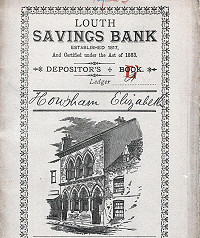Louth Savings Bank

Detail from 1817 pamphlet

Bank book showing 1860 building in Eastgate
In 1800, there was only one bank in Louth: Garfit, Claypon & Co (which eventually became Lloyds Bank). This provided financial services for wealthy people and tradesmen; other people did not use a bank.
In 1817, there was an initiative led by the Warden of Louth, William Wilson, to create a Savings Bank. They produced a lengthy paternalistic pamphlet; here are some extracts:
Provident or Savings Banks are so useful that many are now being set up in all parts of the kingdom, for the benefit of the poorer and middling people. The uses of a Provident Bank may be explained in a few words.
First, a man who can help himself needs to be indebted to nobody.
Secondly, a Provident Bank enables a poor man to help himself. It gathers small savings, such as almost everyone can spare, into a fund that will make him too rich to beg or borrow from anybody but himself.
Thirdly, the poor sometimes talk as if they can do nothing to better themselves. This is true if they work only to get money to spend at the alehouse. Small savings will grow into a heap into which the owner may put his hand when he needs money.
Fourthly, a man by saving his odd money, avoids the sins of drunkenness, of wastefulness, of misspending time, and of neglecting children and family.
Fifthly, a Savings' Bank is not a lottery office. It does not rob many people and make one rich, but it is a common benefit. One shilling a week will make twenty pounds in seven years. With this twenty pounds, consider what you might do - buy a cow, set up a small shop, apprentice a son, furnish a cottage, or many other things.
The depositors are under no obligation to continue payments longer than they choose. They may stop without penalty, begin again when they can afford to do so, and withdraw money without a question asked. To prevent any possible mistake, each depositor will have in his own possession a paper in which will be entered every sum which he deposits.
Initially Louth Savings Bank was open only on Saturday evenings in the Guildhall in Louth Cornmarket. The annual reports show that in the first ten years, more than 100 people opened accounts each year, and by 1828 there was a total of £18,500 in the bank (about £2.3 million in today’s money). In 1860, Louth Savings Bank moved into premises in Little Eastgate, which some of us remember as TSB.